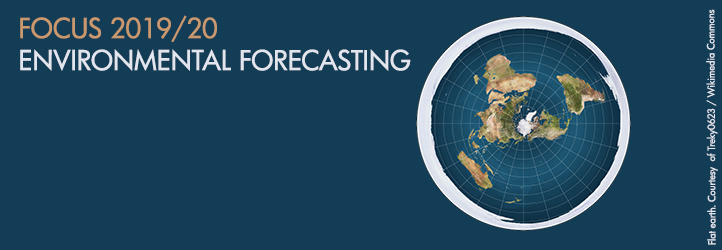Environmental Forecasting

Environmental models are the main scientific instruments through which we analyse and understand long-term and large-scale dynamical human-environment systems. They are also an important tool to transfer academic expertise into daily practices and guide the work of decision makers, while informing the general public. Examples include models that predict landslides and flood warnings, calculate the carbon balances of forests, or the weather forecast, a service used by many on a daily basis. Yet, the intended audience can have crucial implications for the way a model is developed and for the predictions and explanations it produces.
Carsten Dormann, Kerstin Stahl, and Stefan Baumgärtner, all Professors of the Faculty of Environment and Natural Resources at the University of Freiburg will bring together a team of scientists from across the university and international collaborators to investigate the strikingly divergent modelling cultures along with their different scientific credibility, that have evolved in environmental disciplines.
The researchers will examine models from various disciplines including ecosystem ecology, economics, forestry, geology, history, and methodology of science, hydrology, informatics, industrial ecology, and meteorology. The focus’ aim is to distil a best practice from different disciplinary experiences to allow for environmental forecasts that are widely credible, and to formulate a research agenda to address existing deficits.
For more detailed information, please read the project proposal or contact Carsten Dormann.
Organisatoren
- Prof. Dr. Carsten F. Dormann
Biometry and Environmental System Analysis
University of Freiburg
carsten.dormann@biom.uni-freiburg.de
http://www.biom.uni-freiburg.de/mitarbeiter/dormann
- Prof. Dr. Kerstin Stahl
Environmental Hydrological Systems
University of Freiburg
kerstin.stahl@hydrology.uni-freiburg.de
https://www.hydro.uni-freiburg.de/staff/stahl
- Prof. Dr. Stefan Baumgärtner
Environmental Economics & Resource Management
University of Freiburg
stefan.baumgaertner@ere.uni-freiburg.de
https://www.ere.uni-freiburg.de/team-en/stefan_baumgaertner
Abstract
Environmental models are the main tool through which our understanding of natural processes is transferred into practice in a human-dominated world: weather forecasts, flood warnings, carbon balances of forests, landslides, recycling budgets are computed using environmental models along with a range of complexity. Such environmental models comprise representations of the natural processes as well as human impacts and include economic models, such as those simulating trade and environmental impacts at local to global scales.
Environmental disciplines have evolved strikingly divergent modelling cultures, of different scientific credibility. The aim of the proposed Research Focus at the FRIAS is to understand modelling cultures as reflecting distinct goals, distill a best practice from disciplinary experiences that makes environmental forecasts credible across environmental disciplines, and to formulate a research agenda for those areas where we can identify deficits without an existing solution. In addition to publications documenting the results of these activities, we want to write an application for a DFG Research Training Group to train a cohort of PhD researchers in a critical and cutting-edge approach to model development and application in the environmental sciences.

